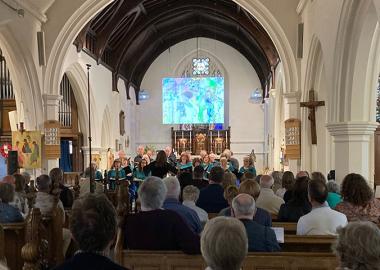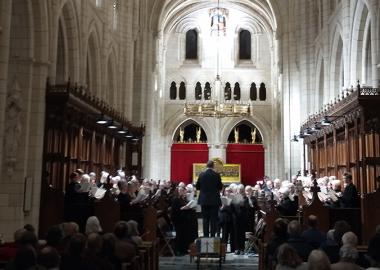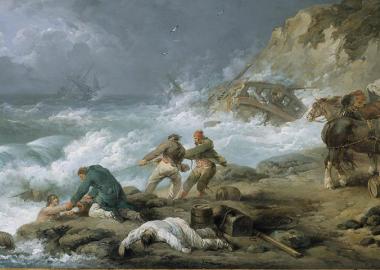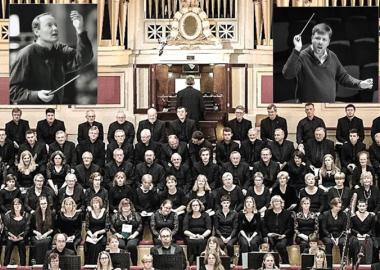Reunited with her flute fourteen years ago thanks to the Cobweb Orchestra, their archivist Christine Macgregor reflects on how this unique organisation succeeds in tempting adults to return to an instrument that has been gathering dust, or to pick one up for the first time.
The Cobweb Orchestra started life in 1995 as an evening course inviting players to 'blow the cobwebs off' their music stands. Under the leadership of Andy Jackson, it has grown into an orchestra with a network of nine weekly groups across the North of England, and an extensive programme of study days, concerts and weekend residentials. The orchestra is completely open access - there are no auditions - and it even offers instruments on loan, as well as bursaries to those who would not otherwise be able to afford to participate.
Dusting the cobwebs off
The original idea of encouraging adults to start playing again remains at the heart of what the Cobweb Orchestra does. Players of all standards are welcome - whether they've just taken up an instrument, are returning to one after a long break, or have been playing for years.
Many Cobwebbers have long since dusted off their music stands, but continue to play with the orchestra, and this makes it possible to explore a wide range of complex repertoire while still remaining open access. The old hands carry along the new players, who gradually manage more of the notes, until one day they realise that they've been 'Cobwebbed' and can sight-read with ease - what opportunities and access to music that skill brings.
In 2015 the Cobweb Orchestra's ninth group, based at Ludworth in County Durham, was formed especially for less experienced players. They have played some of the 'easy' and transposed parts which Andy Jackson arranged for Cobwebs in the early days, and gone on to try out other simplified arrangements, as well as some of the less demanding music from the orchestral repertoire.
'I’ll give it a go’
Cobwebs is all about trying to remove barriers that prevent people from joining an orchestra. There is no requirement to attend every week, so those with busy jobs are welcome just to come along whenever they can.
...the approach is to help them take down any self-imposed barriers, gently changing attitudes from 'I can't' to 'I'll give it a go'.
Andy and the other group leaders are exceptionally welcoming to new players; they appreciate that it is a really big thing to play in front of others when you are out of practice, and that some returners might have had a bad experience in the past that made them give up their instrument. The relaxed and friendly nature of a Cobweb rehearsal means that most people feel able to come back after having made that first big step. Then the approach is to help them take down any self-imposed barriers, gently changing attitudes from 'I can't' to 'I'll give it a go'.
The Cobweb ethos is one of tolerance, encouragement and enjoyment, while still aiming to get the best musically from whatever orchestra has come together on any one occasion. In this nurturing environment, players can be coaxed into doing things they would never have dreamed possible - from taking on a first tentative solo, to becoming the soloist in a concerto.

Christine Macgregor playing Fauré in a tipi at the Cobweb Orchestra's Summerhill Musical Picnic, July 2018 (Photo: Judith Greene)
Fun, friendship and fluting
I have made that same progression over the last fourteen years. It was an advert for three sessions with the Cobweb Orchestra held at Sage Gateshead that prompted me to pick up my flute after a break of twenty years. Despite having done all my grades at school, it took a while to regain confidence, but playing with Cobwebs allowed me to do that in a supportive setting, and have a lot of fun along the way. I now hold two performance diplomas with Trinity, and am a guest player with a number of orchestras across the North East (as well as still playing with Cobwebs of course).
Joining Cobwebs has been life-changing for me, and for many others. As a wind player, there is very little opportunity to join most amateur orchestras. Cobwebs' policy of being flexible on numbers means that anyone can join in, even if they do end up in a long line of clarinets. Some Cobwebbers take up a less popular instrument, but for the inexperienced there is safety in numbers; I certainly learned a huge amount from generous friends in the flute section before I started taking lessons again.
Learning an instrument as an adult is an incredibly exciting and enriching thing to do. Fitting in practice around work and family commitments may be challenging, but the benefits permeate every other aspect of life.
Learning an instrument as an adult is an incredibly exciting and enriching thing to do. Fitting in practice around work and family commitments may be challenging, but the benefits permeate every other aspect of life. The physical and mental demands of playing are felt more keenly as one gets older, but so are the rewards - making music with others can be one of the most sociable and life-enhancing experiences imaginable.
Ahead of its 25th birthday next year, perhaps the Cobweb model might inspire other open-access orchestras to be set up, allowing non-Northern adult learners and returners the chance to experience the benefits and sheer joy of playing in an orchestra.
Visit www.cobweborchestra.org.uk to find out more. Has your group has been working on a unique project or activity that you'd like to share? Find out how to submit your news.










